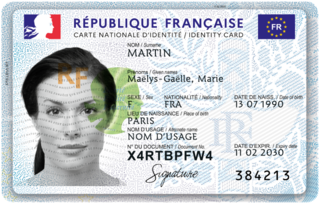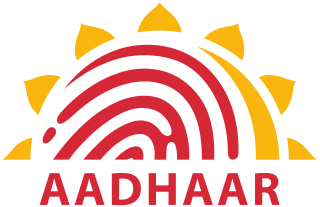
Surveillance is the monitoring of behavior, many activities, or information for the purpose of information gathering, influencing, managing or directing. This can include observation from a distance by means of electronic equipment, such as closed-circuit television (CCTV), or interception of electronically transmitted information like Internet traffic. It can also include simple technical methods, such as human intelligence gathering and postal interception.

Identity theft occurs when someone uses another person's personal identifying information, like their name, identifying number, or credit card number, without their permission, to commit fraud or other crimes. The term identity theft was coined in 1964. Since that time, the definition of identity theft has been statutorily defined throughout both the U.K. and the United States as the theft of personally identifiable information. Identity theft deliberately uses someone else's identity as a method to gain financial advantages or obtain credit and other benefits, and perhaps to cause other person's disadvantages or loss. The person whose identity has been stolen may suffer adverse consequences, especially if they are falsely held responsible for the perpetrator's actions. Personally identifiable information generally includes a person's name, date of birth, social security number, driver's license number, bank account or credit card numbers, PINs, electronic signatures, fingerprints, passwords, or any other information that can be used to access a person's financial resources.
An identity document is any document that may be used to prove a person's identity. If issued in a small, standard credit card size form, it is usually called an identity card, or passport card. Some countries issue formal identity documents, as national identification cards which may be compulsory or non-compulsory, while others may require identity verification using regional identification or informal documents. When the identity document incorporates a person's photograph, it may be called photo ID.

The Identity Cards Act 2006 was an Act of the Parliament of the United Kingdom that was repealed in 2011. It created national identity cards, a personal identification document and European Union travel document, linked to a database known as the National Identity Register (NIR), which has since been destroyed.
An electronic identification ("eID") is a digital solution for proof of identity of citizens or organizations. They can be used to view to access benefits or services provided by government authorities, banks or other companies, for mobile payments, etc. Apart from online authentication and login, many electronic identity services also give users the option to sign electronic documents with a digital signature.
A national identification number, national identity number, or national insurance number is used by the governments of many countries as a means of tracking their citizens, permanent residents, and temporary residents for the purposes of work, taxation, government benefits, health care, and other governmentally-related functions.
ContactPoint was a government database in England that provided a way for those working with children and young people to find out who else is working with the same child or young person, making it easier to deliver more coordinated support. It was created in response to the abuse and death of eight-year-old Victoria Climbié in 2000 in England. Various agencies involved in her care had failed to prevent her death, in particular by individually never realising other agencies had been in contact with Victoria.
The Malaysian identity card, is the compulsory identity card for Malaysian citizens aged 12 and above. The current identity card, known as MyKad, was introduced by the National Registration Department of Malaysia on 5 September 2001 as one of four MSC Malaysia flagship applications and a replacement for the High Quality Identity Card, Malaysia became the first country in the world to use an identification card that incorporates both photo identification and fingerprint biometric data on an in-built computer chip embedded in a piece of plastic.

The French national identity card is an official identity document consisting of an electronic ID-1 card bearing a photograph, name and address. While the identity card is non-compulsory, all persons must possess some form of valid government-issued identity documentation.

The National Database & Registration Authority (NADRA) is an independent and autonomous agency under the control of the Interior Secretary of Pakistan that regulates government databases and statistically manages the sensitive registration database of all the national citizens of Pakistan. Currently, Tariq Malik is serving as Chairman of National Database and Registration Authority (NADRA) Pakistan.
The United Kingdom last had compulsory national identity cards during the World War II when they were introduced for security purposes. Wartime ID cards were finally withdrawn by the Churchill government in 1952 because of the tension they created between the police and innocent citizens. Proposals to reintroduce them have been raised on a number of occasions since then. During the early 2000s and 2010s, organisations such as No2ID campaigned against these proposals.
A government database collects information for various reasons, including climate monitoring, securities law compliance, geological surveys, patent applications and grants, surveillance, national security, border control, law enforcement, public health, voter registration, vehicle registration, social security, and statistics.
There are more than several identity documents used in Sweden. None are compulsory by law, meaning that there is no formal penalty for not possessing one. Certified identification cards are issued by the tax agency. The Swedish police issues passports and national identity cards for Swedish citizens. A Swedish driver's license, issued by the transport agency, is also accepted as an identity document. Banks sometimes issue identity cards for established customers or their children.

Aadhaar is a 12-digit unique identity number that can be obtained voluntarily by the citizens of India and resident foreign nationals who have spent over 182 days in twelve months immediately preceding the date of application for enrolment, based on their biometric and demographic data. The data is collected by the Unique Identification Authority of India (UIDAI), a statutory authority established in January 2009 by the Government of India, under the jurisdiction of the Ministry of Electronics and Information Technology, following the provisions of the Aadhaar Act, 2016.
The Computerised National Identity Card (CNIC) is an identity card issued by Pakistan's National Database and Registration Authority (NADRA). The card is available to any citizen of Pakistan that is 18 years of age or older. The CNIC is a computerised version of the National Identity Card (NIC).
The National Register of Electors is a continuously-updated permanent database of eligible electors for federal elections in Canada maintained by Elections Canada. It was established in December 1996 when Bill C-63 was granted royal assent by the Governor General of Canada, and the preliminary National Register of Electors was populated with data in April 1997 during the final Canada-wide enumeration. It replaced a system which required door-to-door enumeration of eligible electors for each electoral event. The database contains basic information about electors: name, address, sex, and date of birth. An elector may register or update their personal information between elections, or may request to be excluded from it per the Canada Elections Act.
Biometrics refers to the automated recognition of individuals based on their biological and behavioral characteristics, not to be confused with statistical biometrics; which is used to analyse data in the biological sciences. Biometrics for the purposes of identification may involve DNA matching, facial recognition, fingerprints, retina and iris scanning, voice analysis, handwriting, gait, and even body odor.
Historically, state surveillance in the United Kingdom began in Victorian Britain. David Vincent observes that the statistical measurement of communication behaviour began with the introduction of the Penny Post in 1840. An early public scandal occurred in the postal espionage crisis of 1844.
The National Identity Card or NID card is a compulsory identity document issued to every Bangladeshi citizen upon turning 18 years of age. The NID is a government issued photo ID just like the Bangladeshi Driver's license, which is also a biometric, microchip embedded, smart identity card. The NID is required by Bangladeshi citizens for multiple essential public services, such as obtaining utility connections, as well as private services, such as opening bank accounts, in Bangladesh. Initially paper based laminated NID cards were issued since 2006. Then the paper based laminated NID cards were replaced by biometric and microchip embedded Smart NID cards for all adult citizens in Bangladesh from 2016 onwards. This was done to ensure security for the card holder as well as prevent counterfeiting and fraudulence. The government provides the Smart NID card free of charge to all adult citizens of Bangladesh.

The Philippine Identification System ID, also known as the Philippine Identification Card, is the official national identity card for Filipino citizens worldwide and foreign permanent residents in the Philippines. The document is a significant part of the Philippine Identification System (PhilSys), the national identification system to be implemented by the Philippine government.






